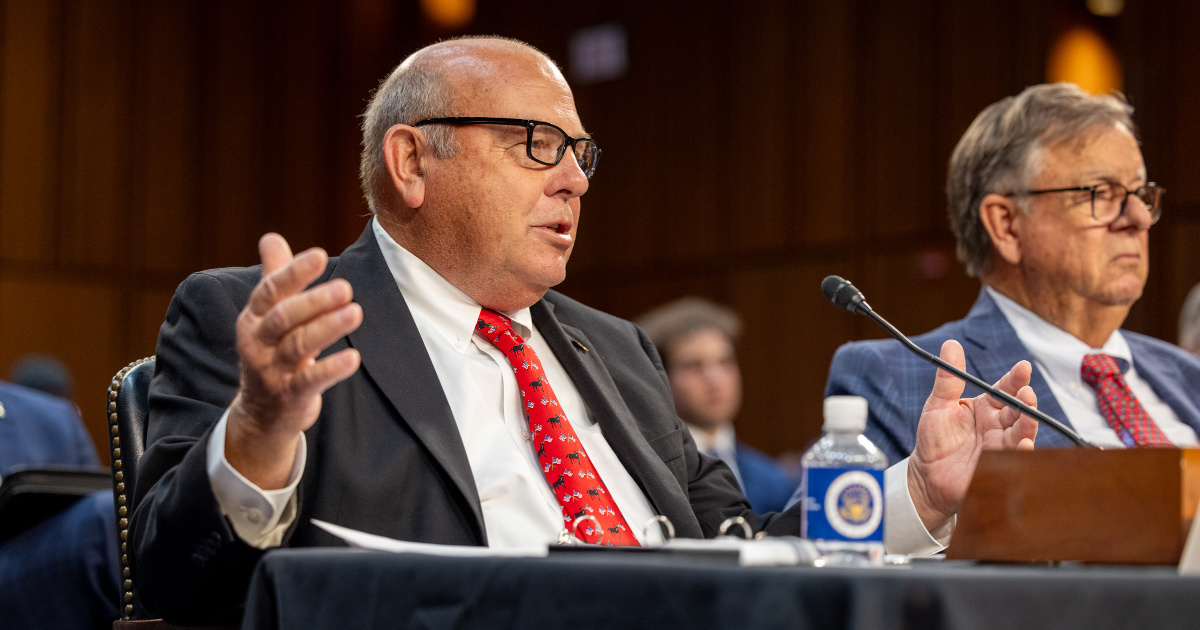Being Heard in D.C.
Posted on Jul 1, 2025
Farm Bureau advocates for American farmers in front of key Senate committee
American Farm Bureau Federation President Zippy Duvall recently testified in front of the Senate Special Committee on Aging to discuss the issue of an elderly farmer population and what can be done to bring a new generation to the agriculture industry. The hearing was entitled, “The Aging Farm Workforce: America’s Vanishing Family Farms.”
Duvall was joined by Jim Alderman of Alderman Farms in Florida; Aaron Locker, managing director of Kincannon and Reed, an executive search and leadership development firm that works with organizations that feed the world; and Dr. Chris Wolf, E.V. Baker Professor of Agricultural Economics and Director of Land Grant Affairs at Cornell University.
“As I travel to farms across this country, I see a lot of gray hair, and while the wisdom of older generations is critical, we must ensure that we are making the way for young and beginning farmers to fill our boots,” Duvall said. “As this committee has identified, there are many challenges facing the agriculture community, but there are also opportunities for Congress to support young and beginning farmers, including with a new Farm Bill.”
Duvall spoke of the need for a modernized, five-year Farm Bill earlier this year before the Senate Agriculture Committee.
“Farmers and ranchers have faced unprecedented volatility since the 2018 Farm Bill, making it harder for many to hold on,” he said in this most recent Senate hearing. “The 2022 census showed the loss of just over 141,000 farms in 5 years … that’s an average of 77 per day.”
Duvall added that, with rising interest rates, higher energy prices, and unchecked supply costs, farmers will plant one of the most expensive crops ever.
“And many will face the tough decision of whether to plant at all,” he emphasized. “This is why the Farm Bill’s Title I safety net is critical.”
In his opening statement, Committee Chair Rick Scott (R-FL) said Congress has not always done right by our farmers.
“The major legislative package aimed at supporting farmers and agricultural workers, the Farm Bill, hasn't passed since 2018,” he said. “This is especially harmful for farmers who have suffered with rising prices for the last four years under the last administration.”
Scott added that while President Trump is having success in breaking down prices and fighting to support American farmers, he needs Congress to act as well, and passing a good Farm Bill is the right place to start.
“Otherwise, we will continue to use outdated information, which compounds the harm done by other economic and regulatory factors,” he said. “As a result, the burden increases on our aging farmers who want nothing more than to see their farm continue in trustworthy hands but are finding it harder and harder to find someone to carry on their legacy.”
The committee’s ranking member, Kirsten Gillibrand (D-NY), said, “Our farmers provide an accessible and abundant supply of food to our whole nation, but with increased consolidation and more farmlands being converted to non-agricultural uses, we are sending ourselves down a very risky path. Our duty in Congress should be to support our farmers whatever way we can.”
Each presenter spoke on several issues facing farmers and the ag industry, primarily focusing on the need to get more young farmers involved to alleviate some of the challenges with an aging farmer population.
"If we want to sustain agriculture in America, we need to smooth the path between generations, which means investing in beginning farmer programs, expanding technical assistance, and offering incentives like estate planning support and making it easier to transfer farms without losing the land or the legacy," Alderman said.
Locker noted several suggestions on how Congress can help address a growing shortage of younger agricultural leaders. Passing a strong, fully funded Farm Bill was one of those suggestions.
“A comprehensive Farm Bill is the foundation of long-term stability for the agriculture industry,” he said. “It empowers rural development, research development, research institutions, and workforce training programs to invest in the future with confidence.”
Duvall added that Congress needs to recognize farmworkers as essential to feeding and fueling our country. It’s time to modernize our outdated system, and only Congress can meaningfully do that.
“A country that cannot feed its people is not secure,” he said. “In order to meet the growing demand for food, fiber, and renewable fuel at home and abroad, we must ensure the continued strength of our farming and ranching communities.”
After his opening statement, Duvall took questions from lawmakers on several issues, including the Adverse Effect Wage Rate, which sets the hourly rate for H-2A guestworkers, the mental health crisis in rural America, international trade deals, and estate taxes. Duvall noted that if farmers are forced to sell their land, the land comes out of production, resulting in it never returning to production.
“There’s so much competition now for land, it prevents young farmers and beginning farmers that want to go into agriculture, God help them, have a difficult time finding that land to do that,” he said. “Availability of land, availability of money, loans, is one of the biggest stumbling blocks young farmers, beginning farmers have going into the business.”